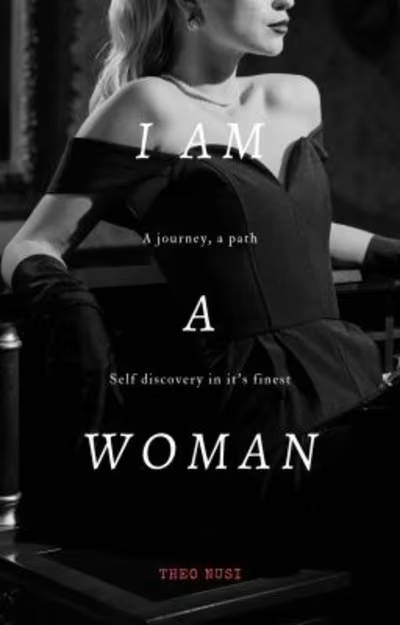Through a Stranger’s Eyes
Horror Fiction
Through a Stranger’s Eyes
Becoming a shadow of myself
Published in

Trigger Warning: This story contains graphic descriptions of violence, murder, child abuse, sexual abuse, captivity, and psychological trauma. It explores themes of survival, trauma response, and the effects of prolonged abuse. Reader discretion is advised.
The hum of the old vintage fan was the only sound that broke the suffocating silence after I plunged the knife into my Uncle Esteban’s chest. The blade slid through flesh and bone as if guided by an unseen force, leaving his body slumped lifeless on the rug. That rug — a faded pattern with an almost invisible coffee stain — had always been at the centre of the room, a silent witness to countless conversations. My gaze flickered to the picture of my uncle and his blind wife hanging on the wall. It was slightly crooked, tilted just enough to lean more to the left than to the centre.
Why was I noticing such details now? I didn’t know why my mind fixated on these trivialities. Perhaps it was because I was crumbling inside, even as I tried to convince myself I was fine.
I stood in the Annex — a detached living area separated from the main house. It served as both a retreat and a storage space where my uncle hoarded his tools, particularly for his woodworking hobby. Or so I had been told.
I once believed the freckles scattered across my nose were the ugliest thing about me, but the unsettling smile that played on my lips as my uncle collapsed to the ground proved me wrong. I couldn’t tell if I felt liberated now that the danger had passed, or if that smile was simply a glimpse into the fractures of my unravelling mind.
My feet dragged across the floor as I staggered toward the storage room. My uncle’s lifeless body lay crumpled behind me, a growing pool of blood soaking into the carpet. I had taken him by surprise, the knife piercing his heart with precision. I didn’t know if he died instantly from shock or the blood loss. Either way, my knowledge of human anatomy has served me well today.
I wasn’t sure what I was looking for as I entered the storage room, but my body moved on autopilot. The countless hours I had spent obsessing over true crime documentaries and murder cases had prepared me for this moment. My eyes landed on a saw lying carelessly on the floor. Then, something else caught my attention — a black travel bag perched on the top shelf, just out of reach. Dragging a heavy stool closer, I climbed up and grabbed the bag.
Twenty minutes later, the deed was done. My uncle was no longer a person — just neatly severed pieces of flesh packed into plastic and stuffed into the bag. I marvelled at how I managed it, weighing barely 110 pounds and standing only 5'3".
My understanding of human anatomy made the process swift. Cutting through muscles, severing nerves, avoiding bones, and separating joints was almost methodical. I cleaned the room with precision, ensuring every trace of my crime was erased, then dragged the suitcase into the house, where my siblings waited.
“Let’s go,” I said curtly. Our bags were already packed, and my siblings stood nervously in the corner.
“What about Uncle Esteban?” Ani asked, trembling, while Tadeo, the last born, stood beside her, clutching her hands.
“Let’s leave before he comes back,” I replied, keeping my tone calm to avoid alarming her.
We walked past Luciana, Uncle Esteban’s blind wife, who sat serenely in the main living room.
“We’re leaving, ma,” I said, feigning respect.
“Why don’t you wait for Steph before you go?” she asked, her warm smile masking something sinister. I ignored her and kept walking, my siblings trailing behind.
When I reached the door, I turned back briefly and caught her expression shift — a wicked smile spread across her face, as though she knew exactly what I had done, followed by a fleeting flicker of relief.
Uncle Esteban lived in the middle of nowhere, 90 miles from the city. The road leading to his property was a lonely stretch surrounded by dense forest. I had always found it strange that anyone would choose such isolation. The house itself was lavish — a sprawling loft with countless rooms and an Annex where he spent most of his time. Over two weeks of exploration, I hadn’t seen another house or sign of life within a two-mile radius.
We loaded our things into a white vintage car, a 1995 Toyota, that Uncle Esteban and I had repaired together. He had handed me the keys, promising we’d take it for a spin someday. At the time, I trusted him, but everything changed after I mentioned wanting to visit Grandma. His demeanour shifted — his golden smile and warm embrace were replaced by something far more sinister.
The car’s fuel tank was almost empty, so I drove it to the small fuel tank Uncle Esteban kept, just 25 feet from the main building. Ani, sitting in the passenger seat, offered to take the wheel, but I ignored her, my attention fixed firmly on the road ahead.
Two miles away, I nearly crashed into a tree. “Elena, are you crazy?” Ani yelled, clutching the dashboard. She hadn’t bothered with a seatbelt, but Tadeo was safe because I had fastened his seatbelt before we took off.
My vision blurred, my heart raced, and my hands trembled uncontrollably. The adrenaline that had carried me through my crime had drained, leaving only the crushing weight of what I had done.
I got out of the car, walked to the trunk, and dragged the black suitcase into the woods.
“Stay in the car,” I instructed Ani, my voice shaky but firm. For once, she listened.
I had walked deep into the woods until I came across a massive shadowed ditch. With nothing else to do and no tools at my disposal, I hurled the bag into the gaping void and turned away without a second glance.
When I returned, Ani was waiting by the driver’s door. “You’re not driving,” she said, blocking my path. “You almost killed us, I’ll drive.”
“But you don’t have a license,” I replied.
“No cops around here, and if we get stopped, I’ll say I’m you. No one will know the difference.” She smirked.
I sighed, knowing she was right. Despite being two years younger, Ani looked exactly like me, down to the last freckle. Even our late grandfather couldn’t tell us apart.
My hands were still trembling; I knew I wasn’t fit to drive, so I didn’t protest any further. I settled into the backseat beside Tadeo, who wrapped his arms around me tightly. His gentle voice filled the silence, singing our mother’s lullaby.
“A la nanita nana, nanita ea,
Mi niño tiene sueño, bendito sea.”
(“Hush-a-bye, baby, hush, hush,
My little one is sleepy, blessed be.”)
Tears welled in my eyes as I stroked his hair. “I miss Mummy too,” I whispered.
As Ani drove us down the lonely road, I rested my head against the window, with white noise humming softly in my headphones, trying to calm down my nerves. The world outside blurred as memories flooded back.
“I know this is hard on you guys,” Mom whispered in the stillness of the night, sitting beside me on the bed. I lay there staring at the wall with my back turned to her. “Your dad and I have to go to America to give you all a better future. You know how things are here.”
She had said it a million times before, but somehow, hearing it again didn’t make it any easier. The words felt heavy, like a burden I couldn’t shake. We were about to leave everything behind — our home, our friends, our school — all for the unknown. We were going to stay with Uncle Esteban for a while, and though Mom reassured me it would only be a few months, something about the idea of living under his roof made my stomach twist. It wasn’t that I didn’t like him, It was just… unsettling, the thought of being uprooted and having to rely on someone else, someone distant.
Mom had tried to comfort me, telling me that once they had settled in, they would sort out our tickets and we’d be able to join them. I should’ve felt excited about the opportunity, about the chance for a new life, a life that could offer more than the struggles we had known in Mexico. But all I felt was a strange mix of relief and dread.
She sighed softly, brushing a stray strand of hair from my face before pressing a gentle kiss to my forehead. “Take care of your siblings while we’re gone,” she murmured. Then, without waiting for an answer, she stood and quietly left the room, leaving me alone with my thoughts.
I stayed there, staring at the blank wall, It wasn’t just the uncertainty of what lay ahead that troubled me, but the thought of being without them for so long. Mom and Dad were everything to me, and the idea of being separated from them, even for a few months, felt almost unbearable. But I couldn’t show that. I couldn’t let them see how much I was hurting. After all, they were doing this for us, to give us a better future. But no matter how many times they told me it would be okay, I couldn’t shake the feeling that everything was about to change — and not necessarily for the better.
We had arrived at Uncle Esteban’s house and at first, it felt like heaven on earth — or so I thought.
For the first few weeks, it seemed like a dream. But as time passed, little things began to gnaw at me. The perfection of it all started to feel unsettling. Uncle Esteban and his wife had been married for 15 years, yet they had no children. That alone wasn’t unusual, but what struck me as odd were the rooms. Aside from their master bedroom, there were five other bedrooms, each elaborately decorated for children. Three were painted in soft shades of pink, filled with dolls, stuffed animals, and princess dresses so beautiful you’d think they were props from a fairy tale. The other two rooms were designed for boys, with toy cars, planes, and action figures scattered about. The closets in all five rooms were packed with clothes of every size, from toddlers to teenagers. The sheer number of outfits was overwhelming — each one unique, as though they’d been handpicked for different children.
At first, I thought they had gone to great lengths to make us feel at home, but as days passed, I couldn’t shake the feeling that it was all too much, too perfect, and far too suspicious.
My unease turned into dread the day I stumbled upon a hidden compartment in one of the rooms. We had been living there for three months now, and boredom was starting to creep in. I was in one of the girly, fairytale-like rooms, trying one of the ball gowns that were in the closet. As I adjusted the dress in front of the full-length mirror, I noticed it was slightly crooked. Instinctively, I reached out to straighten it, but as I shifted the mirror, something unexpected happened — a faint creak echoed in the room, revealing a hidden door concealed behind the frame
It took some effort to pry it open, but when I did, I discovered a narrow staircase leading down to a hidden underground room. The air grew colder as I descended, and the smell hit me before I even reached the bottom. The room was dimly lit, but I could make out chains bolted to the walls, dark stains that looked suspiciously like blood, and the unmistakable sight of a small, decaying body lying in the corner. My stomach churned violently, and I barely managed to keep myself from vomiting. My heart raced as panic set in, but I forced myself to leave quickly, shutting the hidden door behind me.
After a week of relentless pestering, I had convinced my siblings to visit our maternal grandmother. She lived far away, but I framed it as an innocent trip to reconnect with family. When I told Uncle Esteban and his wife, they seemed calm — too calm. They agreed to take us there the following Saturday, and for a moment, I thought I had outsmarted them. But the more I thought about their reaction, the more it felt wrong. Saturday came, and our bags were packed and ready to go. I thought we were finally leaving, but everything changed in an instant. Uncle Esteban called us into one of the rooms, his usual warm demeanour replaced by something cold and menacing. Without a word, he locked the door behind us, taking away our phones, tablets, and laptops.
The room felt suffocatingly small. Ani panicked first, She banged on the door, screaming and crying, her fear of enclosed spaces overwhelming her. Tadeo, confused and frightened, sat in the corner with tears streaming down his face as he clung to a stuffed animal he had brought from home. I just stood there in silence, frozen. My mind was racing, but my body refused to move. I already discovered what Uncle Esteban was capable of. I understood what was at stake, and that realization broke something inside me. At that moment, my mother’s last words echoed in my mind: ‘Take care of your siblings while we are gone.’ But those words were shattered by the haunting images that flooded my thoughts: Ani’s head rolling at my feet, Tadeo chained and brutalized, and I, helpless, locked in a chair in that dark, dingy room. I had to escape, we had to flee, we had to survive. I couldn’t afford to lose — I wouldn’t lose. Yet, as fear and hope wrestled within me, a chill coursed down my spine, draining every last ounce of emotion from my being. I became an empty shell, my mind quiet but my body trembling with a dark resolve. This was the day everything changed. The day I decided we weren’t just leaving — we were escaping.
When I opened my eyes, the car had come to a complete stop. I blinked, trying to shake off the grogginess, and glanced at my watch to see how long I had dozed off.
“What’s going on, Ani?” I asked, noticing her tense grip on the steering wheel.
“The fuel’s finished,” Ani murmured, in a trembling voice. She stared straight ahead, her hands clutching the wheel as if letting go would unravel her completely.
“What’s wrong with you?” I asked, concerned. Her anxiety felt heavier than it should have for a simple fuel issue.
Ani’s voice cracked as she whispered, “The car isn’t moving, and Uncle Esteban… he’ll find us soon. If he does, we’ll be locked in that creepy room again.” A tear slipped down her cheek.
“I thought you said you liked that room?” I tried to lighten the mood with a smug remark, but Ani wasn’t in the mood for jokes. Her fear was palpable. “Don’t worry,” I reassured her, leaning closer. “We’re far away from that house. He’s not going to get us. Let’s just step out, stretch a little, and figure out what to do next.”
Ani hesitated, her hands still glued to the wheel. “Are you sure?” she whispered.
“Yes,” I said firmly. “But if you’re too scared, I can go check things out while you two stay here.”
“No,” she said quickly, her voice shaking. “Don’t leave us here.”
“Alright, we’ll go together,” I agreed, trying to calm her.
Ani’s reaction was nothing new. After we were locked in the room, Uncle Esteban began sliding meals to us through a small opening in the door — like a dog door. Every night, he would call Ani and me together. He’d instruct us to undress, leaving us standing in the cold, bare, while he watched. Sometimes, he’d reach out to touch, but I’d fall to my knees, pleading with him to let Ani go. He always listened, and eventually, he stopped calling Ani. From then on, it was only me.
By the third night, I stood in my usual spot, emotionless. He had stripped me of my shame. I was a doll — a lifeless figure frozen in place. Uncle Esteban rose from the creaking, old brown rocking chair where he always sat, and reached out to touch me, his hands invading places no one had ever dared to touch. Tears streamed down my face, but I didn’t move. I couldn’t.
Through the haze of my torment, I noticed Luciana pass by the door. She paused for a moment, her head tilting as though she sensed something. But then she walked away. Luciana might have been blind, but she wasn’t deaf. Why hadn’t she noticed? Why hadn’t she tried to help us?
The thought of being so helpless haunted me. All I wanted was to run, to escape, but I couldn’t risk it. I couldn’t afford to anger Uncle Esteban. His wrath might fall on my siblings, and I wouldn’t let that happen.
Once Ani relaxed, I turned to Tadeo, who sat beside me in the backseat. “Hey, bud, let’s stretch our legs for a bit.”
He groaned, rubbing his eyes, but eventually nodded and opened the door.
We had already driven past the long, lonely roads that led away from Uncle Esteban’s house. Though we were now at the outskirts of the city — the closest one to that cursed house — the streets still felt eerily desolate. It was late afternoon, a time when students should have been heading home from school, but there was no sign of life.
Some traffic lights flickered uselessly, while others stood dark, their bulbs long dead. The signboards lining the streets were old and neglected, streaked with grime and peeling paint. Yet oddly, the road itself was clean, as if someone had cared enough to sweep but not enough to fix anything else.
After walking for a while, I spotted a convenience store in the distance. It was small, almost unnoticeable, and as we stepped inside, its shabbiness became even more apparent. The shelves were sparse, with only a few items scattered here and there. It was the kind of place that looked like it hadn’t seen a proper delivery in months.
Behind the counter sat a man who seemed just as rundown as the store. His eyes were heavy with exhaustion as if he hadn’t slept in days, and his expression screamed of someone who hated every second of his job.
I turned to Ani and Tadeo. “Grab whatever you want,” I told them quietly, watching as they hesitated for a moment before wandering off to the nearest shelf. Then I approached the counter, the man’s weary gaze barely flickering in acknowledgement as I stepped closer.
“Excuse me,” I began. “Where’s the nearest gas station?” “It’s about a mile from here,” he replied without looking up. “And the nearest bus station?” “It’s not far. Head straight out of here, take the first left, and you’ll find it down that street.”
“Thanks,” I said, pausing. “What about a working phone booth?”
“The ones nearby don’t work, but there’s a functional one at the bus station,” he added.
I nodded and turned to see Tadeo rushing toward me, clutching a box of cookies. Ani followed, holding a bottle of Sprite and some water. I paid for the items, and we left the store, heading toward the bus station.
When I finally found the phone booth, I dialled my mom’s new number, the one I had memorized long ago. Sometimes, when my mind spiralled into dark, anxious thoughts, I would distract myself by counting numbers or reciting digits of Pi. Memorizing her number during our first night at Uncle Esteban’s house had been one of those moments. I’d imagined myself stranded in the middle of nowhere without a phone, and learning her number by heart had been a small comfort — a lifeline in my sea of fear.
As soon as I heard her voice crackle through the receiver, tears streamed down my face. I couldn’t hold back the fear and emotions I’d bottled up for so long. My voice broke as I recounted everything that had happened at Uncle Esteban’s house.
Meanwhile, Ani and Tadeo sat at the bus stop, waiting for me. Tadeo was preoccupied with his cookies, while Ani fiddled with my Rubik’s cube — a deliberate distraction to keep her mind from wandering into dark places.
When I told my mom about our escape, I left out one crucial detail — the part where I killed him. Instead, I said we’d managed to get away because he’d left the house to get supplies.
Mom was horrified. For a moment, there was only silence on the other end of the line. It was my dad, calm and composed as always, who broke the silence. He’d overheard everything.
“Where are you?” he asked, his voice steady.
“At a bus stop,” I replied.
“Do you have any money?”
“No, sir…” I hesitated. The secret account I’d been hiding from them flashed in my mind. This was a dire situation, and I had no choice. “I only have five pesos in my account.”
Without hesitation, Dad sent some funds to me. His voice remained even, but I could hear the urgency beneath his words. “Take the money and get to Isabella’s house,” he instructed.
Sis Isabella lived alone in a modest one-bedroom apartment. She was born much later than my mom, and my parents had practically raised her. For years, I believed she was my older sister until I turned ten and learned the truth.
Though we were close to her, our parents had thought it would be too much of an inconvenience for her to take us in. That’s why we ended up with Uncle Esteban in the first place.
As I stood at her doorstep, exhausted and still reeling from everything, the floral wreath hanging on the front door reminded me of Mom and Dad. A faint sense of relief danced in my heart, a brief respite from the storm inside me. When I rang the doorbell, Sis Isabella, who had already heard everything from Mom, opened the door and immediately pulled us into a tight embrace, sobbing softly.
She wore her usual T-shirt and jeans, her hands and face smudged with paint. It looked like she had been in the middle of a project when she got the call. Sis Isabella was an art teacher at the local college, working tirelessly toward her dream of becoming a world-renowned artist. My parents had always supported her aspirations, helping her purchase painting supplies and even the modest apartment where she now lived.
Three months had passed since we left Uncle Esteban’s house, and still, there was no word from his wife, Luciana. Every day, I checked the news, my stomach knotting with anxiety, wondering if she had realized by now that he was never coming back. Would the police start searching for him? Or was she too afraid to report his disappearance, knowing it might expose the horrors of his crimes?
I couldn’t shake the memory of the fleeting glimpse of relief I’d seen on her face that night. Maybe she had been a prisoner, too, trapped in her own way. Was that how she had lost her sight? I’d heard she wasn’t born blind. Despite her disability, Uncle Esteban had claimed to love her. But now I wondered if that love had been a cage, a darkness that consumed her just as it had tried to consume us.
I shook off the thought, but it lingered, haunting the corners of my mind.
We had finally arrived in America, reunited with our parents in their new house. A new place, a new home, and soon, I would begin my first year of university.
Everything around me was new, except for me. I wasn’t sure if I could ever leave behind what had happened in Uncle Esteban’s house. I didn’t know if I could ever be the innocent person I once was. Everything about me felt dimmed, as though the light inside had faded. The girl with brown eyes and brunette hair, who once looked back at me in the mirror, now felt like a stranger. My tan skin, once something I took pride in, now seemed marked — forever stained by the blood of that day.
I wasn’t the same person anymore. But somehow, I kept moving forward, even if I didn’t know where the road would take me. Maybe someday my mind would bury the horrors deep enough for me to breathe again. Or perhaps, I would stay like this — forever a shadow of who I used to be, still holding on to the fragile hope that even shadows could find light.

Author’s Note: You’ve witnessed the beginning of Elena’s descent — now, the darkness truly unfolds. Uncle Esteban was just the beginning. But now, the real question lingers — will the monster consume her, or will she become the terror that haunts it? This is where her mind unravels, where the eerie, psychological horror takes full form. If you are prepared for the chilling depths of her journey, let your claps and comments guide me forward into the madness.
Like this project
Posted Mar 18, 2025
The hum of the old vintage fan was the only sound that broke the suffocating silence after I plunged the knife into my Uncle Esteban’s chest. The blade slid th…
Likes
0
Views
1
Timeline
Feb 2, 2025 - Feb 2, 2025





